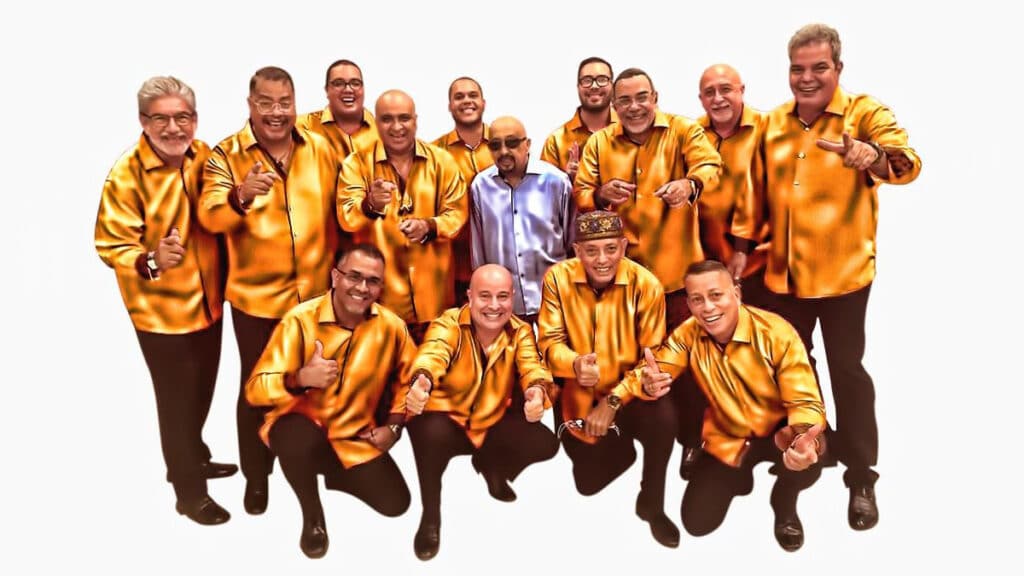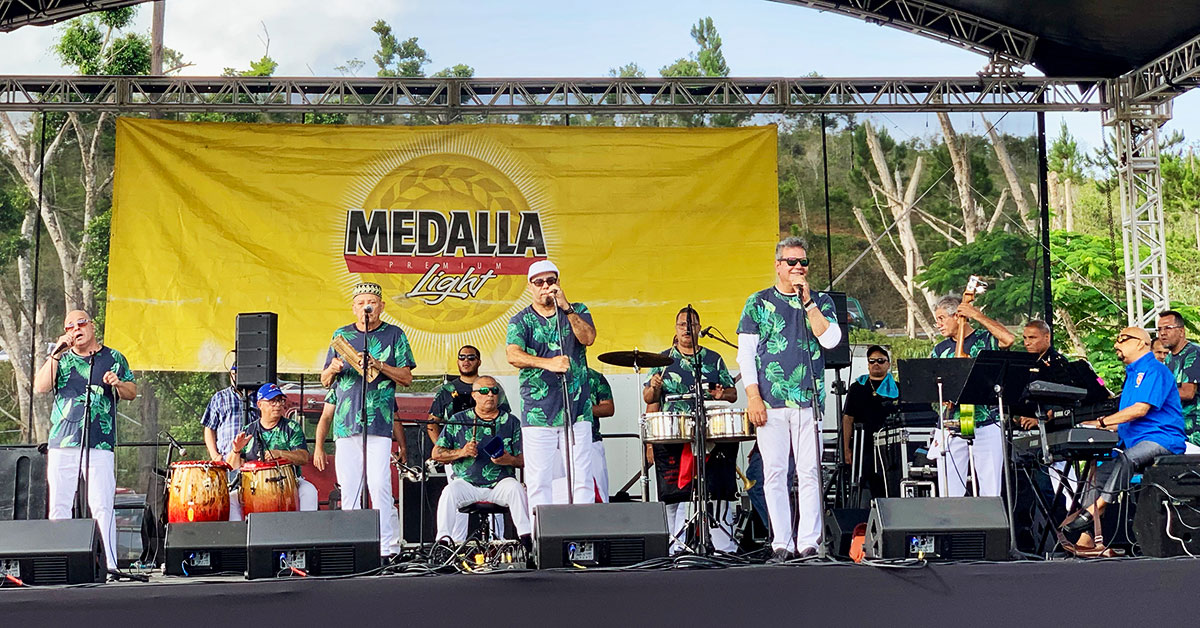La Sonora Ponceña (The Ponce Sound) is one of Puerto Rico’s legendary salsa orchestras. They are more rumba-influenced than most of the salseros Boricua. “Moreno soy, porque nací de la rumba…” as we say in Puerto Rico: “Rumba, Bomba, Plena, Salsa.”
“Fuego en el 23” by Cuban son legend Arsenio Rodríguez was about a real fire in New York City in building 110 on the 23rd floor.
We love dancing to “Ahora Sí” (1980) and “Yambeque” (1982). “Ahora Sí” opens with a beautiful rumba break. The song is an unusual salsa in that it takes the woman’s point of view. The original singer Yolanda Rivera sings, “Nobody ‘takes’ me at home, that’s what I said Mister. So this is conga night and its good that the rumberos arrived.” Meanwhile the chorus sings that “I throw myself onto the floor.” That’s no big deal now, but those were very bold words for a Puerto Rican woman in 1980.
La Sonora Ponceña in New York City

La Sonora Ponceña, led by Papo Lucca, celebrates 70 years of Cuban son-influenced salsa from Ponce, Puerto Rico; at Lehman Center in Jerome Park, The Bronx; on Saturday March 30, 2024 at 8pm. From $58. lehmancenter.org 🇵🇷
New York City Venues
They have probably played everywhere over the years, but these are some recent venues:
- Coney Island Amphitheater
- Lehman Center at Lehman College in The Bronx.
- XL Nightlife night club in Elizabeth, New Jersey.
The Story of La Sonora Ponceña is the Story of La Salsa
The band is from Ponce, Puerto Rico’s second biggest city and the main town on the south of the island.
A center of Indigenous Taíno and Afro-Puerto Rican culture, Ponce is less polluted by U.S. culture than San Juan, the capital in the north.
Ponce still has the feel of a small Puerto Rican town. It’s very quiet now. It has one of Puerto Rico’s oldest Carnivals and has influenced Puerto Rican bomba, plena, and salsa. It’s said that both bomba and plena come from Barrio, San Anton, a small Afro-Puerto Rican neighborhood in the city center.
La Sonora Ponceña was part of the evolution of son Cubano dance music of the mid-nineteenth century into the salsa of 1970s New York City. Every region has its own sound and the blending of those sounds is what created the salsa.
- Cuba has the son of the eastern mountains around Santiago de Cuba and the rumba of the northwest around Matanzas and Havana.
- Puerto Rico has the bomba and the plena with variations in Loíza in the northeast and Ponce in the southwest.
- The U.S. has the Creole jazz of New Orleans and the swing of Harlem in New York City.
The son started as small groups of tres guitar, violins or flute and percussion. In the 1920s son bands expanded into sextetos (sextets). In the 1930s son bands added a trumpet and became septetos (septets). In the 1940s son bands added congas and piano and became conjuntos.
This is where La Sonora Ponceña comes in during the 1940s. The founder Enrique “Quique Lucca” Caraballo loved the Cuban band La Sonora Matancera, the band that launched the career of Celia Cruz. Quique picked up the new Cuban conjunto format. But being Puerto Rican, he had bomba and plena in his soul. This changed the sound. Now it was La Sonora Ponceña.
In its purest form salsa can be defined as Cuban dance music of the 1950s played mostly by Puerto Ricans in New York City in the 1970s and 80s.
Remember that Cuba got cut off from the rest of the world in the 1960s. When young Cubans heard the salsa in the 1990s, they wondered why we were still playing the old music of their fathers from the 1950s. Their son had evolved further into the timba which reabsorbed African rhythms, bebop jazz, and rock played by the excellent musicians trained in Cuba’s classical music schools.
That’s where Latin music is now. The musicians are so well trained and have absorbed so many influences that the music doesn’t have the same feeling as the old school salsa from the streets and the mountains.
El Conjunto Internacional
The band that became La Sonora Ponceña was started by Quique Lucca as El Conjunto Internacional in 1944.
One day Quique’s son Papo surprised the band when he started playing the congas during a practice when he was just five years old.
Conjunto Sonora Ponceña
The band reformed as Conjunto Sonora Ponceña in 1954. Soon Quique brought his young son into the band. The band’s first recording was a 78 with “No puede Ser” on one side and “Tan Linda que Era” on the other.
New York City
Back in the day, the drum never stopped in “El Barrio” East Harlem or in the South Bronx. La Sonora Ponceña started playing in New York City in 1960. The band was welcomed by the Puerto Rican community. They were a little bit of home and La Sonora had this amazing 12-year old pianist Papo Lucca.
Across Fifth Avenue from El Barrio was Harlem and Harlem was swinging. La Sonora picked up that sound. In La Sonora’s music you can hear melodies from some popular jazz tunes and the ever present sirens of New York City.
“Hacheros Pa’ Un Palo”
The band made their first 33 rpm record “Hacheros Pa’ un Palo” which became one of their signature songs in 1968. From that beginning they made one great album after another.
“La Ceiba”
The ceiba is a sacred tree. It is the tree of life. On the road from San Juan to Arecibo, there is a spot with two beautiful giant ceibas.
In 1979 La Sonora Ponceña recorded an album “La Ceiba” with legendary Cuban singer Celia Cruz. Papo Lucca appeared with Cruz in the television documentary “Salsa.” He also played on the FANIA All-Stars album “Habana Jam.”
50th Anniversary
The band celebrated 50 years of performing with a live album “50 Aniversario, En Vivo” in 2007. “Remembranzas” is a great song on the album. The live version is even better than the original.
Fiestas Patronales
Every little town in Puerto Rico has a patron saint and an annual festival honoring them. There are two or three or four of these festivals every weekend all over Puerto Rico.
The big draw at night is dancing on the street or in a park to a live salsa band. One of the great salsa bands you can dance to is La Sonora Ponceña.
Everybody in Puerto Rico knows their most popular songs and many sing along while dancing.
“Hachero Pa’ Un Palo, Juana Bayona, Boranda, Canto Al Amor, Moreno Soy, El Pío Pío, and Feugo en el 23. The list goes on and on.
Here is the band at the Aibonito Flower Festival in Puerto Rico in July 2019.

“Moreno soy porque nací de la rumba
Y el sabor yo le heredé del guaguancó“
From “Moreno Soy” by La Sonora Ponceña (1978)
